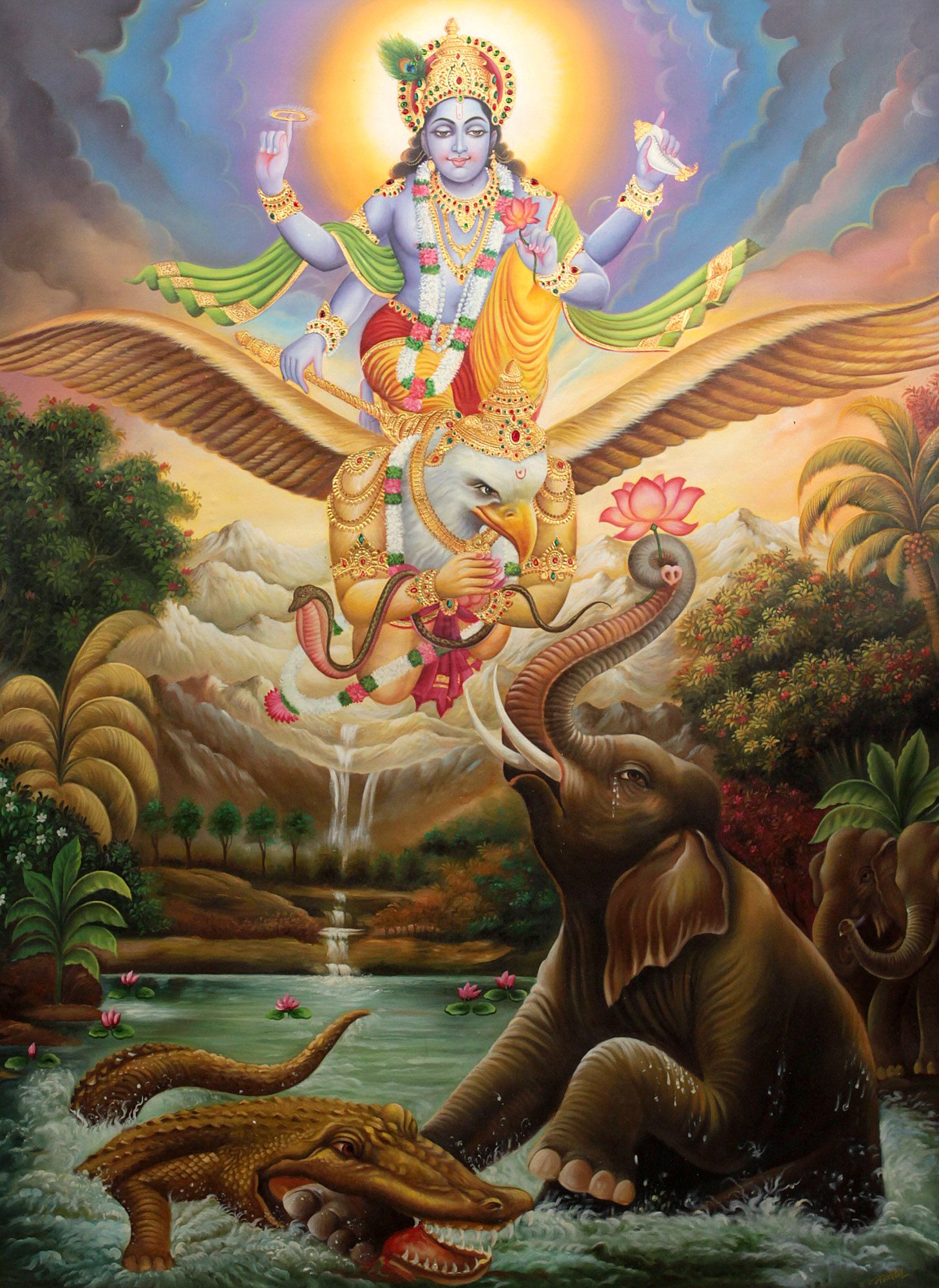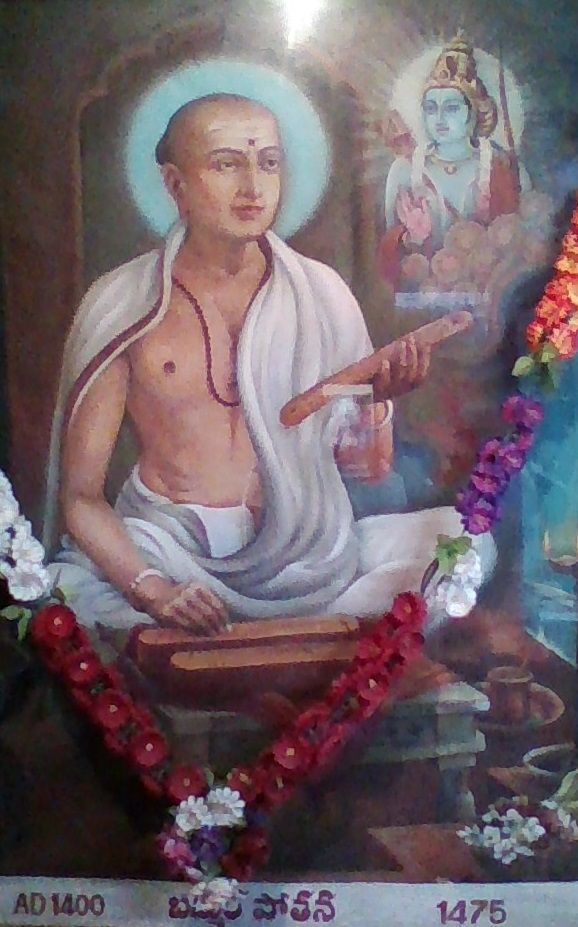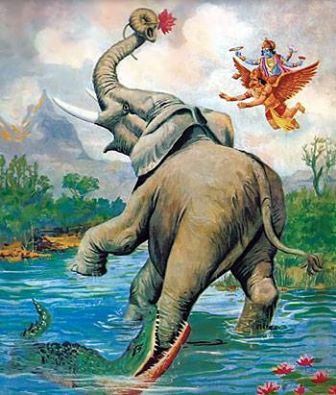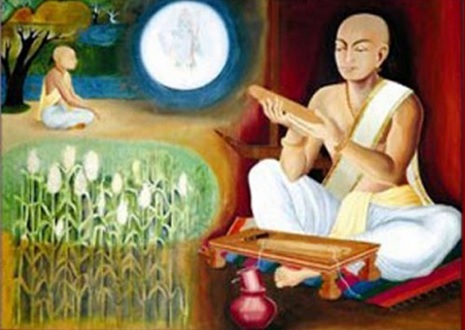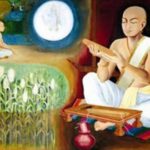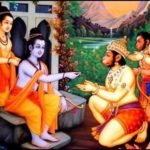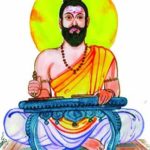The following Post is based on the Translation of Professor T.S.B. Narasaraju garu
Long-time readers may recall the privilege we had to promote the work of a respected Professor by the name of T.S.B.Narasaraju. We published four excerpts (one, two, three, four) of his translation of Potana Bhagavata Purana (Dasama Skandha). The original work is in praacheena Telugu, which he duly translated into English for the benefit of pravaasi Telugu Youth.
Pothana Mahakavi was a great scholar from the modern state of Telangana beloved by Telugu speakers throughout united Andhra.
Continuing Andhra Cultural Portal’s Spotlight on Telugu Literature is a wonderful work based on one of the most beloved texts in Telugu Poetry.
Having showcased excerpts of his Dasama Skandha we are honoured to present an excerpt of the Ashtama Skandha of Pothana’s Bhagathava Purana, translated into English by Professor T.S.B. Narasaraju. The Eight Canto focuses on the famous pauranic episode Gajendra Moksham.
Much as the Andhra Mahabharatamu is a classic of Telugu literature so too is the Andhra Maha Bhagavatamu another. But at a time when the word Andhra itself is being reduced in scope, what better work to unify all Telugus than the Telugu Bhagavatamu of Telangana’s Pothana.
For those of you who wish to read the Bhagavata Purana translated into contemporary Telugu, please refer to this excellent site: www.telugubhagavatam.org. However, many of our diasporic youth are unable to understand Telugu, let alone, read Telugu script. Therefore, Sri Narasaraju garu has embarked upon this tremendous effort on behalf of all Telugus, to translate key parts of the Mahabhagavatamu, into English. Here is his own selected quote from Pothana’s original to express the sentiment behind his effort to bring a classic to the current day.
kamalakshu narchinchu karamulu karamulu
srinadhuvarninchu jihva jihva
sura rakshakuni chuchu chudkulu chudkulu
seshasayi ki mrokku siramu siramu
Hands deserve to be called as hands only if they pray to the Lord. Tongue is worthy of being called as a tongue only if it praises and describes the Lord. Eyes can be called as eyes only when they see the Lord. Head deserves its name only if it salutes to the Lord
Author
T.S.B. Narasaraju garu is a much respected academic who taught Chemistry at Acharya Nagarjuna University (Guntur) and Banaras Hindu University. He is also learned in traditional Saastriya Telugu, and in his retirement, has embarked upon translating the Bhagavatamu into English for the benefit of our pravasandhra youth.
Professor Narasaraju has done a great service for our Telugu community and we are privileged to bring his work to you in a Series of Articles. These will feature excerpts from his Taatparyam of the Ashtama Skandam of Telugu Bhagavatamu.
Publishers and other inquirers can reach Sri Narasaraju via email at:
shamraan@gmail.com
Book
Below we provide an excerpt from Part I of T.S.B. Narasaraju garu’s book:
Ashtama Skandha of Potana’s Bhagavata Purana.
It is a translation into English of the 8th Canto of Pothana’s Telugu rendition of the Bhagavata Purana. On request of Professor Narasaraju, we have attached his translation of the Ashtama Skandhamu, which can be downloaded at the end of the article. Here is the Dasama Skandhamu available for download:
Click here to download Part I of the English Translation of Potana’s Bhagavata Purana (Dasama Skandha)
Without further ado, here are selected excerpts from the new book.
[Excerpt. Some emphasis ours.]
Copyright: T.S.B.Narasaraju. All rights reserved. 2020.
ASHTAMA SKANDHA OF POTANA`S BHAGAVATA PURANA
A Literal Translation into English (Part I)
Life on earth is sustained by many essentials. The most important among them, to live with joy and enthusiasm, is love-divine. Although Sri Bhagavata Purana is the quintessence of Karma, Bhakti and Jnana, it primarily elicits love-divine which is transcendental in its experience. Blessed are those who drank the nectar of love! Blessed are the Gopikas who could taste it and got completely merged with Sri Krishna Chaitanyam!
There are many translations of Vyasa Bhagavata Purana into several Indian languages. Its translation into Telugu by Sri Bammera Potana of fourteenth century stands on a high pedestal both in its language and sweetness of Bhava. Its verses are sublime in thought, sweet to chant and easy to memorise. They bring out a vivid picture of stories and expressions of feelings of characters, especially the Leelas of Bhagawan Sri Krishna even to ordinary readers who wish to read them as stories.
Telugu literature with all its lofty thoughts and rich translations is being slowly forgotten by the masses in the din and roar of modern life and its various compulsions. The fact that Puranas, epics and Upanishads, among others, build the character of our nation is not remembered and replaced with a modern craze for standard of living leading to dangerous tendencies.Such a trend causes all kinds of unhealthy comparisons and hatred among people resulting in destruction. These great texts that build character among human beings are going out of reach. Efforts must be made to bring a fresh breeze of life through a revival of a desire for higher knowledge.
It is with this sincere and dedicated thought that Dasama Skandha of Potana`s Bhagavata Purana has been brilliantly translated by Sri T. S. B. Narasaraju into English for the benefit of many residing abroad who lost touch with their mother-tongue, Telugu. Sri Raju`s heart throbbed with enthusiasm to bring Potana`s Bhagavata Purana to children of Telugu resulting in the form of this book.The author introduced the present work very well by giving necessary background in the form of a brief biographical account of Potana, style of his literary prowess, purpose behind the present translation and the sources of inspiration motivating the completion of the present work. In the beginning of the work itself the author brought out the difference between Puranas and Itihasas. This sets the tone of the text and surges the reader ahead with ease in mind and clarity in intellect. His translation is lucid and deep in its flavour. Without losing the essence of the original he brought out the translation in an exemplary manner using simple and effective language. The work is inspiring and holds the reader`s mind with inquisitiveness to read further. It is lucid in style and flows with beauty of expression. The content is absorbing.
The work begins with an invocation seeking the blessings of all those inspiring Sri Raju to grasp the core essence of Srimad Bhagavata Purana. In his Introduction Sri Raju wonderfully described how Potana got motivated by Lord Sri Ramachandra to translate Bhagavata Purana into Telugu from Sanskrit. It was, however, dedicated to Sri Krishna, a Purna Avatara and a Supreme Lord manifesting himself with all his powers unconcealed unlike other incarnations of Lord Vishnu.
It is not an easy task to bring out expressions from Potana`s verses into English. Sri Raju achieved this because of his devotion to the Lord, sincere self-application and taking up the work as a Tapas. I am sure that this work reaches the hands of many inspiring them to read, understand and cultivate the great ideals of Rishis of yore getting motivated to live as beacons of light to many around their lives.
May Lord Sri Krishna bless one and all!
Hari Om!
Swami Chidrupananda
“ Adaramoppa mokkididunu adrisuta hrudayanuraga sampadiki doshabhediki prasanna vinodiki vighnavallika chediki manjuvadikin ashesha jagajjanandavedikin modaka khadikin samada mushikasadiki suprasadikin” ……………………………Bammera Potana
(I salute to him who is a recipient of maternal love of goddess Parvati, a cleanser of sins, a source of pleasure to his devotees, a destroyer of impediments, adept in talking sweetly and a centre of joy to his countless number of devotees. He relishes Modakas being seated on a Mooshikavahana.)
Bhagavata Purana propagates the concept of Navavidha Bhakti, the nine established forms of Bhakti mentioned in Narada’s Bhakti Sutras. These are: 1. Sravana (Listening), 2. Sankeertana (Praising), 3. Smarana (Remembering), 4. Paricharya (Serving), 5. Archana (Worshipping), 6. Vandana (Prostrating), 7. Dasya (Serving), 8. Sakhya (Befriending) and 9. Atma Nivedana (Surrendering). Atma Nivedana is emphatically illustrated in Gajendra Mokshana which means liberation or release of Gajendra.
…
The events of the period of the fourth Manuvu are described here. Ten among his sons who were strong such as Ketuvu, Vrusha, Nara and Khyati became kings. Satyaka, Hari, Veera and others became Devatas. Trisikha became Devendra. Jyotirvyoma and others became Saptarishis. Lord Vishnu was born as Hari to Harimedha and Harini. Being an embodiment of kindness and lord of all the Lokas, he rescued Gajendra who was caught by a crocodile and thus saved his life. Parikshit uttered the following words to Suka:-(17, 18).
“Oh! The best among sages! How did a fight take place between an elephant which roams about in thick forests and a crocodile moving in water? I am enthusiastic about listening to this story. Please narrate. I listen to it as a feast to the ears and pleasant to the mind. Stories of the virtuous Hari narrated by the learned are heard by the elders with great delight.” The story narrated by Suka to Parikshit in response to the request of the latter was described with delight by Suta to sages Saunaka and others present in the gathering (19, 20, 21 and 22).
There existed a beautiful mountain known as Trikuta in a sea known as Palasamudra. Its height, length and width were each equal to about a Yojana, which is about ten miles in modern mensuration. It had three peaks. The first of them was full of gold. The second was full of silver while the third was covered with iron. Precious stones and minerals present on the sides and peaks of the mountain made its neighbour-hood effulgent with diverse colours. There were huge trees, creepers and bushes on it. There were streams flowing noisily. Divine air-crafts usually flew over it. Kinneras loitered through its valleys (23).
…
Some elephants of the forest were so ferocious that the other animals were afraid of even looking at them. They had huge bodies flowing with pride and arrogance. They came out once from the caves of the mountain to roam about. They got tired after playing and merry-making for some time. They desired to get into a pond. They moved in the direction of it by sensing the blowing of moist breeze (26). Darkness hides itself during the day in the caves of mountains being afraid of the sun. It comes out into the open in the evening after the sun-set. Those elephants were compared to such darkness (27). Those young elephants were endowed with the fortune of strength. They could dash against the mountains. They had the audacity to face the lions. They marched forward even ignoring thunders (28). They started roaming about with frightful playfulness. The groups of tigers started hiding themselves behind bushes seeing those elephants. Bears ran into caves. Wild hogs could hide themselves in pits. Antelopes and black bucks ran to the farthest corners in all directions. Wild buffaloes and bison found lakes and ponds to hide themselves. Monkeys climbed hill-tops for shelter. Snakes of the forest crawled inside ant-hills. Peacocks flew into the sky. With their tails full of feathers, the terrified yaks started fanning the elephants to redress their tiresomeness (29).
…
Countless number of elephants thus started roaming about all over that forest. One elephant-king, Gajendra got isolated from the groups with a few female-elephants, accompanying and serving him. He thus lost track of the groups of elephants and moved randomly, tired and exhausted with thirst. He lost his god-given sense of discrimination and drifted away with his group of female-elephants (37, 38). Gajaraju was affectionately offering to his sweet-hearts tender leaves of grass plucked from low-lying water-pits, bunches of fresh leaves and flowers. He was fanning them with his ears soaked with Madajala. He was gently scratching the skin below their necks with his tusks. He was sniffing the backs of the female-elephants followed by raising his trunk skywards sensing the onset of mating time. He was thus playing and roaming about in their company (39). The roundness of frontal globes on the fore-head of Gajaraju had a perfection ridiculing the breasts of girls in their youth who desired to hide themselves to ward off comparison. Majestic walk by the elephant reduced the pride of maidens resulting in the loosening of the ornaments on their waists. Unable to match with the shine of the tusks of the elephant, the facial beauty and smiles of the maidens desired to get hidden. The female-elephants followed Gajaraju as if the wives of Diggajas such as Anjana, Abhramu and Kapila got attracted to his beauty (40). He had to wander extensively in those forests having lost track. He continued to roam about along with the female-elephants totally exhausted (41).
Gajendra saw a pond containing diverse types of freshly blossomed lotuses, over which Bhramaras were hovering. The pond was found to have tortoises, fish and crocodiles. It was, in addition inhabited by swans, Chakravakas and crows. Diverse types of trees existed on the banks of the pond (42).The elephants came near that pond full of lotuses and totally free from turbulence. Their tired bodies experienced a soothing feeling by the fragrant breeze blowing from the lake. Their ears had a feast from the melodious sounds made by the swans of the lake having eaten plentifully the stems of lotus-plants of the lake. Their sense of smell got satiated by the fragrance from the blossomed lotuses. The droplets of water emanating from the ripples of unpolluted water of the lake quenched their thirst. The nascent beauty of the lake transcending that of the others in the three Lokas became a feast to the eyes of the elephants. They entered the lake being intoxicated oblivious of the power of discrimination provided by the sense-organs (43, 44). They filled their trunks in abundance with water, sprinkling on their cheeks and filling their capacious bellies to the brim with gurgling sounds (45). Gajendra sucked water through his trunk, filled it up, stood up on his hind legs, directed his trunk skywards and let loose the water as a jet. The turbulence so created in the pond scared the crabs, crocodiles and fish of the pond to such an extent that they jumped towards the sky as if to catch the constellations of stars such as Meena and Karkataka Rasis. The Devatas got astonished seeing the event (46, 47).
…
A crocodile-king from the lake saw Gajendra in it. He took a leap from the waters of the lake with the waves soaring high sky-wards accompanied by loud noisy bubbles splashing from the surface of the lake. The threatening sound so released created a scare among the groups of other crocodiles of the lake. The tossing up of the tail of the crocodile-king generated a storm in the waters of the lake resulting in huge whirl-pools. The turmoil created in the waters of the lake was so violent that trees from the banks of the lake got uprooted with impact from the agitated water. The crocodile-king spotted his target, got enraged, positioned himself appropriately, jumped up making a deafening sound and had a tight grip of the elephant-king, an attack comparable to the eclipsing of the sun by Rahu (51). Gajendra wriggled out quickly from the grip, lifted his long trunk and dashed it against the crocodile. The latter appeared to have been killed by the impact being thrown away in the waters. On the contrary, he recouped quickly and grasped the front legs of the elephant. The audacious elephant-king was least affected by the counter attack of the crocodile and pierced the lower ribs of the latter with sharp pointed tips of his tusks getting disentangled from grip of the crocodile-king. The battle continued unabated with the crocodile catching the tail of the elephant with his sharp fangs (53).
“Kari diguchu makari sarasiki, gari darikini makari diguchu garakari berayan
gariki makari makariki gari, bhara manuchunu natala kutala bhatu larudu padan (54)”
The elephant was dragged into the pond by the crocodile, while the elephant pulled the crocodile towards the shore each trying to excel the other. The heroes of the Lokas of Atala and Kutala seeing the see-saw battle wondered whether the elephant was stronger than the crocodile or vice versa (54).
Click here to download the English Translation of Potana’s Bhagavata Purana (Ashtama Skandha)
Disclaimer: This book represents the opinions of Author, and should not be considered a reflection of the views of Andhra Cultural Portal. The author is responsible for ensuring the factual veracity of the content, herein.
Copyright: T.S.B.Narasaraju. All rights reserved. 2020.
